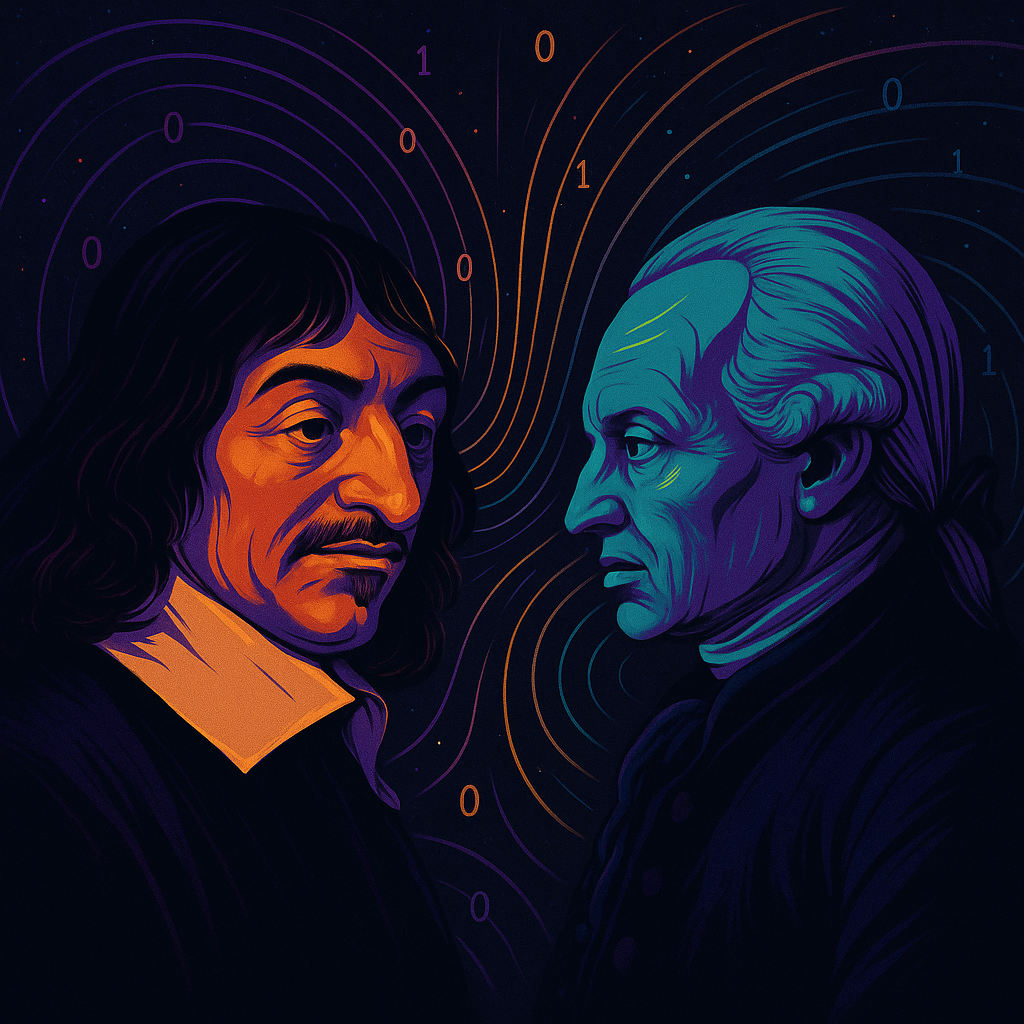KANTEXT: THE STATELESS SOLUTION HIDING IN CENTURIES OF VECTOR GRAVITY
How AI debates revealed the philosophical foundations of our computing problems

My AI Showdown
Three months ago, I had an argument with my AI assistants that changed everything. Not about consciousness or ethics—about whether "state interference" is even possible in a properly designed system.
GitHub Copilot insisted that traces could "interfere" with each other if you didn't properly namespace them. "Unwanted state drift," it warned, would creep in like a slow leak.

The Copilot's response demonstrated a classic anti-pattern of over-engineering and introducing unnecessary complexity. By suggesting mechanisms to "clear" or "reset" state, it was proposing solutions to a problem that doesn't exist.
Claude Haiku demolished this with brutal precision: "There is NO mechanism by which a previous trace could 'interfere' with a new calculation." Each frame maintains its own trace vector. Each trace is a unique hash. Hashes are deterministic. "This isn't 'state drift'—this is PRECISE, REPRODUCIBLE computation."
But here's the kicker: Haiku could only see through the illusion because of the Claude Project I had created where we codeveloped these ideas. Without that critical context in its window, Haiku falls into the exact same vector gravity as Copilot.
The Philosophical Urgency
Every prompt is an exercise in epistemology. When I tell Copilot that "state interference is impossible in our system," I'm not just debugging code—I'm negotiating what counts as knowledge, what constitutes proof, what we mean by "state" itself.
As AI blurs the lines of thought, reasoning, and meaning, learning to use words to express ideas clearly has become an essential skill for the LLM future. This matters now more than ever.
Redefining State
Let's be precise about what we mean by "state"—a term we've stretched to mean everything and nothing.
The original concept traces back to Boolean logic:
- 1840s: George Boole formalizes logic as algebra
- 1930s: Claude Shannon connects this to electrical switches
- The revelation: An open circuit = False, closed circuit = True
The Physical Reality
"State" originally meant: what is the voltage level at this transistor right now? High or low? 1 or 0?
That's it. The physical configuration of electronic components at this instant.
The Conceptual Stretch
Fast forward to today: "state" now means giant nested JSON dumps of user settings, application configuration, database records, session variables, and every other piece of information our software touches.
These are fundamentally different concepts. One is about reading voltage levels in physical circuits. The other is about modeling an entire universe of interconnected information.
Cartesian vs Kantian
The Cartesian Foundation
René Descartes crystallized the mind/body split that frames how we build information systems. His res cogitans (thinking substance) and res extensa (extended substance) created a design pattern for modern logic: isolate the knowing agent from the formal object of knowledge.
This Cartesian separation is why we treat variables as independent dimensions. It's the philosophical foundation for state as a Cartesian product.
Kant's Challenge
Immanuel Kant saw the flaw. His "transcendental unity of apperception" insisted that knowledge isn't about mapping independent coordinates—it's about how the mind imposes structure on experience through inherent context.
"Space, time, and causality are forms of intuition through which any object must appear to a subject. They're conditions of possibility for knowledge, not external givens."
Kant was arguing for context-first thinking 243 years ago. The insight has been waiting for us ever since.
Vector Gravity Exposed
The Three Explosions
State management suffers from three related but distinct problems:
1. Cartesian Product
- The structural assumption that system state = cross-multiplication of variables
- Variables treated as orthogonal dimensions that multiply without influence
- Descartes' legacy: clean separation allowing precise combination
2. Combinatorial Explosion
- Rapid, exponential growth as you add variables
- System with n components, k states each = k^n total states
- The math is brutal and unforgiving
3. State Explosion
- Reachable states become intractably large due to runtime interactions
- About behavioral branching over time, not just static combinatorics
- The way concurrent systems evolve through their state space
The Human Insight
We build our computers to work OPPOSITE from how our brains work. Human reasoning optimizes for the definite and the probable. We use heuristics, take shortcuts, ignore unlikely possibilities.
Traditional state management insists on modeling EVERY POSSIBILITY regardless of probability. This is why bloom filters are valuable—they acknowledge that perfect knowledge isn't necessary.
Strange Graph Solution
From Cartesian Products to Strange Graphs
What if we followed Kant's insight to its logical conclusion? Instead of treating state as independent variables that multiply, we could treat it as contextual relationships that compose.
A Strange Graph is exactly this:
- Data and rules co-located
- Content-addressed, immutable
- Every fragment carries its own context
- No ambient global state to manage
The Deterministic Alternative
When everything is immutable and context-explicit, the philosophical problems disappear:
- No race conditions (nothing changes)
- No interference (each context is isolated)
- No state drift (computation is deterministic)
- No combinatorial explosion (context constrains possibility)
What we call "state" becomes a precise, mathematically verifiable record of computation. Not something to manage, but something that emerges naturally from the architecture.
👉 Next Up
Next week, I'll walk through TypeSynth, the first implementation of these ideas. We'll see how rejecting the Cartesian frame leads to systems that are simultaneously simpler and more powerful.
But first, notice this: every time you reach for a variable or worry about state consistency, you're making a philosophical choice. Descartes or Kant. Independence or context. Cartesian products or strange graphs.
The gravity is strong. But the alternative has been waiting for 243 years.
"The critical claim of transcendental idealism is that knowledge is only possible if there are necessary conditions of the possibility of experience." - Immanuel Kant
Fork this idea. Prove me wrong. The conversation starts now.
Connect with Strange Graph:
- Subscribe for weekly updates
- Star the project on GitHub
- Join the discussion


